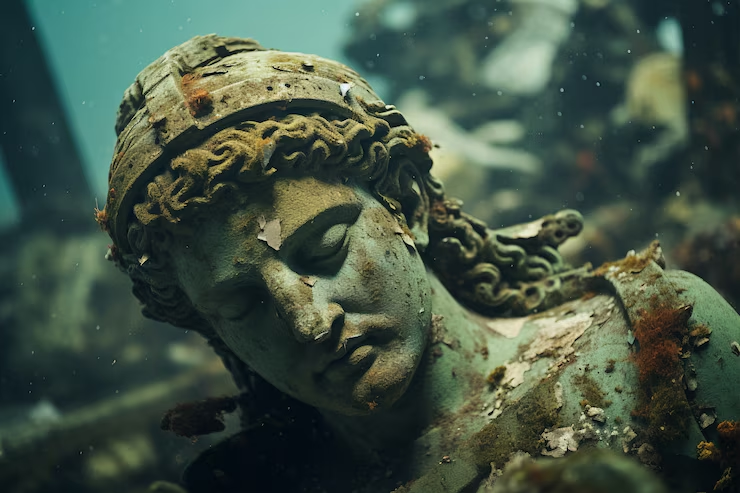Ancient Greek myths are full of weird birthing stories. From Aphrodite/ Venus, who was the result of a Titan’s castration, to Zeus finding out he is pregnant to Athena after having a headache (yes, the goddess of Wisdom was conceived in the brain), here are the ten weirdest births in ancient Greek mythology!
Weird Birthing Stories in Ancient Greek Myths:
- The Birth of Venus (Aphrodite)
- The Birth of Goddess Athena
- The Birth of Dionysus
- The Birth of Helen of Troy
- The Birth of Hercules and Iphicles
- The Birth of Apollo and Artemis
- The Birth of Zeus’ Siblings
- The Birth of Hephaestus
- The Birth of Phanes
- The Birth of Perseus
Number 10: The Curious Birth of Perseus
Perseus is the legendary founder of Mycenae and one of the greatest ancient Greek heroes; he is the one who actually killed the snake-haired Gorgon Medusa. Like with most mythical heroes, he was the son of Zeus and a mortal. The mortal was a princess named Danae. Danae’s father, Akrisios, had heard of a prophecy that his future grandchild would kill him. Akrisios locked Danae into a bronze chamber to make sure that she would never get impregnated. Well, that did not stop Zeus from impregnating Danae in the form of golden rain. Princess Danae ended up giving birth alone in the bronze chamber, surprising everyone when they found her with baby Perseus in her arms.
Number 9: Phanes and the Cosmic Egg
Phanes was an ancient Greek deity of procreation in the Orphic cosmogony. He was the generator of life and he might give the answer to the age-old question “what came first, the chicken or the egg?”. Well, according to Phanes’ myth it was the egg that came first. The ancient Greek deity came out of the cosmic egg along with a serpent and became the first king of the universe, long before Zeus took over.
Number 8: The Parthenogenesis of Hephaestus
Hephaestus is the ancient Greek god of crafts, fire, and volcanoes. He was the only Olympian god who had some physical abnormalities. According to Hesiod, this was a result of parthenogenesis – his mother, Hera, conceived him alone. Hera decided to give birth to a son to take revenge on Zeus for being unfaithful.
Interested in learning Greek? Join Helinika’s video courses!
Number 7: The Second “Birth” of Zeus’ Siblings
Zeus was the youngest child of Titan Cronus and Rhea. His eldest brothers and sisters, including Hera, Poseidon, and Hestia, were swallowed whole after their birth from their father. Rhea was able to hide baby Zeus before he was consumed alive and, once he grew up, he was able to free his siblings from Cronus’ belly. Zeus’ siblings were basically born twice and from both parents.
Number 6: The Birth of Artemis and Apollo in Exile
Artemis and Apollo are two twin Olympians who were the result of Zeus’ and Letos’ union. Hera, Zeus’ wife, had banned Leto from giving birth on land – whether that was the mainland or an island. However, Leto managed to find refuge on Delos island, which was surrounded by swans. Artemis was born quite easily, but Apollo’s birth lasted nine days and nights, because Hera has abducted Eileithyia, the goddess of childbirth. According to some variations of the myth, newborn Artemis assisted with the delivery of her twin brother.
Number 5: The Unwanted Birth of Hercules/Heracles and Iphicles
Heracles (also known as Hercules) is one of the most well-known ancient Greek mythical heroes of all times. Since he was the son of Zeus and a mortal, Hera did everything she could to stop his mother Alcmene from giving birth to him and his twin(?) brother Iphicles. Iphicles was actually a brother from another father and was not related to Zeus. Hera did everything she could to slow down the birth of the two brothers and even tied the legs of Alcmene together. The goddess was finally distracted by a servant and Alcmene delivered the babies successfully.
Number 4: The Spectacular Birth of Helen of Troy
Mythical Helen was once considered to be the most beautiful woman on Earth. Her kidnapping sparked the Trojan war, which was the starting point of Homer’s Odyssey. Helen was conceived and delivered under surprising circumstances. Zeus transformed into a swan and mated with a woman named Leda. She then laid eggs that hatched and yielded Helen and her brothers and sisters.
Number 3: The (Re)Birth of Dionysus
Dionysus is the god of wine and he was later associated with ancient Greek drama. The god was actually born twice. His mother was Semele, a mortal who (unsurprisingly) got impregnated by Zeus, and was targeted by Hera for this exact reason. This time, Hera pretended to be a friend of Semele and asked her about the father of her unborn baby. Semele revealed the true identity of the father but Hera pretended to not believe her. Semele then asked Zeus to tell the world about his son – something that Hera knew would anger him. Zeus sent lightning bolts to Semele, killing her. However, he did not want his unborn child to die as well. He sewed the fetus on his thigh and few months later, Dionysus was born.
Number 2: Athena’s Birth Was a Literal Headache
Goddess Athena was also a result of Zeus’ lust for a mortal woman. This time, the woman was called Metis. Zeus impregnated her but then heard of a prophesy that Metis would give birth to two children; her firstborn would be a girl and she would later give birth to a boy who would overthrow Zeus. The king of the gods and goddesses of Mount Olympus decided that the best way to protect himself would be to consume pregnant Metis alive. Some months later, Zeus started feeling unwell. He had a terrible headache that felt like something wanted to tear his head apart. Hephaestus then followed Hermes instructions and split Zeus’ head apart to see what the problem was. And that was when goddess Athena jumped out of his head. She was fully grown and already wearing her armor!
Number 1: The Not So Graceful Birth of Venus (Aphrodite)
Aphrodite (or Venus in Latin) is the goddess of beauty and romance. Her birth has been featured in multiple art pieces since the Renaissance, but the reality is that is was not as graceful as it’s been depicted. Aphrodite was the result of the castration of Cronus from the Olympians. Her brothers and sisters threw the severed parts of Cronus in the ocean and she rose from the sea foam.

